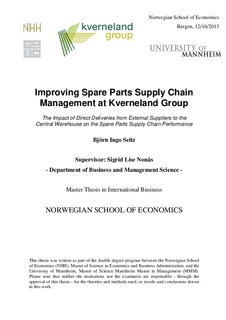Improving spare parts supply chain management at Kverneland Group
Master thesis
Permanent lenke
http://hdl.handle.net/11250/195541Utgivelsesdato
2013Metadata
Vis full innførselSamlinger
- Master Thesis [4372]
Sammendrag
The top management of the Kverneland Group, a Norwegian MNC which develops,
produces and distributes agricultural machinery, wants to improve the performance of its
spare parts supply chain and considers making some adjustments of its current purchasing
strategy. In the present setting, all spare parts which are needed at the central warehouse are
ordered from the Kverneland factories which developed the machines to which the
respective parts belong. However, since most of the spare parts are not manufactured inhouse
by Kverneland factories but produced externally, the factories usually have to order
the required parts from external suppliers on behalf of the warehouse. According to the
proposed future purchasing strategy, the warehouse would order the parts directly from the
external suppliers and they would also be delivered directly to the warehouse. Against this
background, this thesis analyzes possible consequences of a change from the current to the
future setting for the Kverneland Group, the Business Area After Sales and the Kverneland
factories. The proposed purchasing strategy would especially affect the administrative
ordering and physical order handling activities which are currently executed by the factories
on behalf of the warehouse. Furthermore, the future setting would affect the total lead times
of spare parts which have a high influence on the stock levels and the capital tied up in
inventory at the central warehouse. The main purpose of this study is to find out if
Kverneland should stay with its current setting of sourcing spare parts or if the group should
implement the proposed purchasing strategy. At the end of this thesis, main conclusions and
recommendations are drawn which can be used as guidelines for the implementation of the
proposed purchasing strategy. Furthermore, this study discusses which compensation fees
the warehouse should pay towards the factories if the future setting would be realized.
